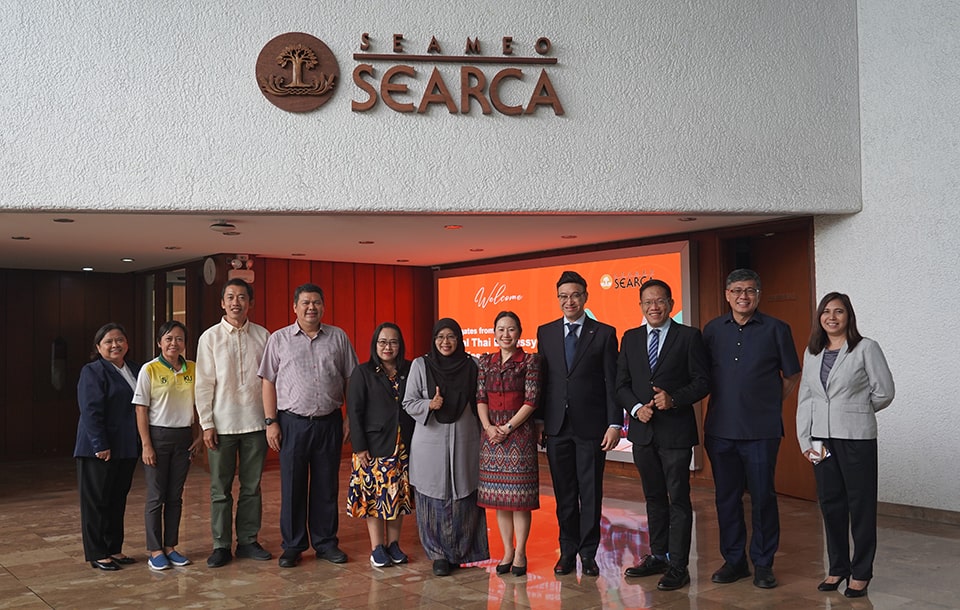
A delegation from the Royal Thai Embassy Manila and Kasetsart University (KU), led by Mr. Rangsant Srimangkorn, Minister and Deputy Chief of Mission, Royal Thai Embassy Manila, visited the Southeast Asian Regional Center for Graduate Study and Research in Agriculture (SEARCA) on 28 August 2024. With him were Mr. Witsarut Piyavongsomboon, First Secretary, Royal Thai Embassy Manila; Asst. Prof. Dr. Supapatpimol Simlee, Assistant to the President for International Affairs at KU, and other KU officials.
Dr. Nur Azura Adam, SEARCA Deputy Director for Programs, welcomed the visitors, highlighting Thailand's significant role as one of the founding member countries of the Southeast Asian Ministers of Education Organization (SEAMEO), the Center's mother organization. She also emphasized SEARCA and KU's longstanding partnership, particularly through the university's membership in the Southeast Asian University Consortium for Graduate Education in Agriculture and Natural Resources (UC), a network of top universities from Southeast Asia, Canada, Germany, Japan, and Taiwan.
Mr. Rangsat thanked SEARCA for co-organizing the Symposium on Sufficiency Economy and Sustainable Development held on 27 August 2024 as part of the 75th-anniversary celebration of diplomatic relations between Thailand and the Philippines. He commended Dr. Glenn Gregorio, SEARCA Center Director, for his lecture at the event and expressed interest in future collaborations with SEARCA on similar initiatives. Meanwhile, Asst. Prof. Dr. Supapatpimol underscored the importance of SEARCA and KU's collaboration in agriculture, specifically citing UC's Master of Science in Food Security and Climate Change (MS FSCC) as an example.
During discussions, Asst. Prof. Dr. Supapatpimol inquired about the Center's initiatives on social innovation.
"Since we focus on agriculture, our primary focus is on driving social innovation within the community," Dr. Nur responded.
She introduced SEARCA's Emerging Innovation for Growth Department, which focuses on transferring agricultural technologies to benefit communities. Dr. Nur also highlighted SEARCA's Research and Thought Leadership Department's (RTLD) School-plus-Home Gardens Program (S+HGP), which is aimed at improving school children's nutrition, education, and economic well-being.
Dr. Gerlie Tatlonghari, RTLD Program Head, elaborated on S+HGP's mission to pique the youth's interest in agriculture. She highlighted how the program uses school gardens as experimental platforms to showcase agricultural innovations and cultural practices. She added that the lesson plans are integrated with topics like climate change and biodiversity, aligning with the agricultural concepts introduced through the school gardening initiatives.
Assoc. Prof. Dr. Weerasak Fungfuang, Head of the Department of Zoology, and Asst. Prof. Dr. Kriengkrai Satapornvanit, Dean for Sustainable Development, both of KU, mentioned that Thailand also has school gardening projects that incorporate organic agriculture and the integration of animals like poultry, livestock, and fish alongside school feeding programs. They asked how SEARCA's S+HGP integrates business or livelihood aspects into its initiatives. In response, Dr. Tatlonghari reiterated the project's focus on economic well-being. She also mentioned S+HGP's offshoot projects: School-plus-Home Gardens cum Biodiversity Enhancement Enterprise (SHGBEE) and the School Edible Landscaping for Entrepreneurship (SEL4E), which center on enterprise and entrepreneurship, respectively.
Dr. Tatlonghari also shared that to expand the project's reach, SEARCA published the School-Plus-Home Gardens Guidebook and will soon offer E-learning for Champions to Scale Up School-plus-Home Gardens in the Philippines and Southeast Asia, a continuing education program in collaboration with the University of the Philippines Open University.
The visitors were also oriented on SEARCA's Seed Fund for Research and Training (SFRT), which provides starter funds to researchers and scientists who significantly contribute to Southeast Asian agriculture but lack the funding to carry out their projects; Grants for Research towards Agricultural Innovative Solutions (GRAINS), which provides starter funds not only to researchers and scientists but also to inventors and agripreneurs to scale up their technology or innovation model; and the Consortium for Agricultural Development, Research, and Extension (CADRE), a regional network of top-tier institutions envisioned to collaborate and deliver research and extension support on the most pressing issues and challenges faced by the Southeast Asian agriculture sector.
To cap the meeting, both parties identified several potential areas for collaboration, including the possible expansion of SHGBEE in Thailand, potential membership of KU in CADRE, and joint events to commemorate the 75th anniversary of Philippine-Thailand diplomatic relations.